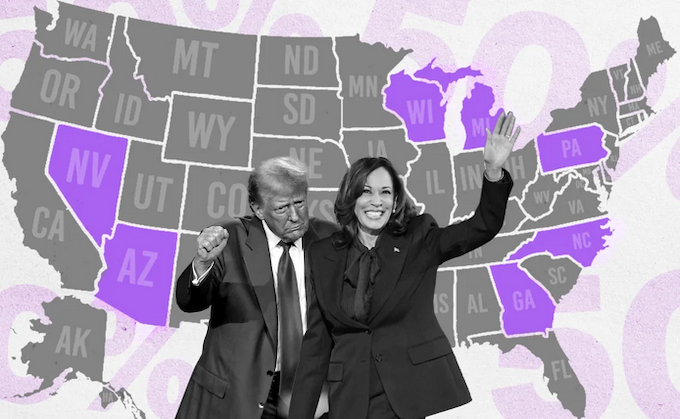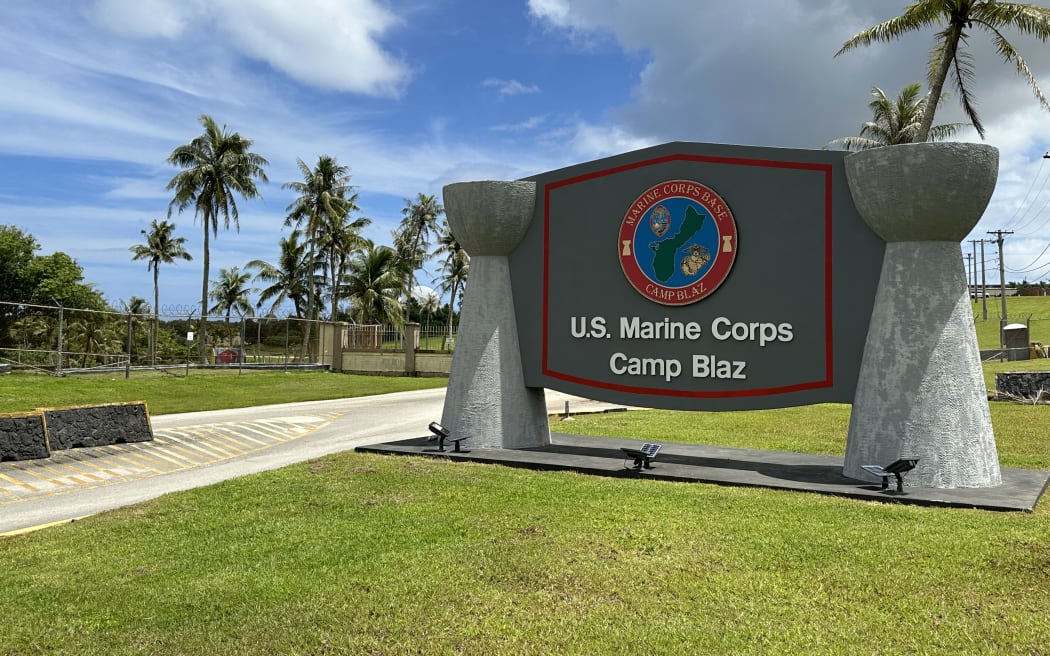
By Eleisha Foon, RNZ Pacific senior journalist
As the US election unfolds, American territories such as the Northern Marianas, American Samoa, and Guam, along with the broader Pacific region, will be watching the developments.
As the question hangs in the balance of whether the White House remains blue with Kamala Harris or turns red under Donald Trump, academics, New Zealand’s US ambassador, and Guam’s Congressman have weighed in on what the election means for the Pacific.
Massey University’s Centre for Defence and Security Studies senior lecturer Dr Anna Powles said it would no doubt have an impact on small island nations facing climate change and intensified geopolitics, including the rapid expansion of military presence on its territory Guam, following the launch of an interballistic missile by China.
Pacific leaders lament the very real security threat of climate-induced natural disasters has been overshadowed by the tug-of-war between China and the US in what academics say is “control and influence” for the contested region.
Dr Powles said it came as “no surprise” that countries such as New Zealand and Australia had increasingly aligned with the US, as the Biden administration had been leveraging strategic partnerships with Australia, New Zealand, and Japan since 2018.
Despite China being New Zealand’s largest trading partner, New Zealand is in the US camp and must pay attention, she said.
“We are not seeing enough in the public domain or discussion by government with the New Zealand public about what this means for New Zealand going forward.”
Pacific leaders welcome US engagement but are concerned about geopolitical rivalry.
Earlier this month, Pacific Islands Forum Secretary-General Baron Waqa attended the South Pacific Defence Ministers meeting in Auckland.
He said it was important that “peace and stability in the region” was “prioritised”.
Referencing the arms race between China and the US, he said, “The geopolitics occurring in our region is not welcomed by any of us in the Pacific Islands Forum.”
While a Pacific Zone of Peace has been a talking point by Fiji and the PIF leadership to reinforce the region’s “nuclear-free stance”, the US is working with Australia on obtaining nuclear-submarines through the AUKUS security pact.
Dr Powles said the potential for increased tensions “could happen under either president in areas such as Taiwan, East China Sea — irrespective of who is in Washington”.
South Pacific defence ministers told RNZ Pacific the best way to respond to threats of conflict and the potential threat of a nuclear attack in the region is to focus on defence and building stronger ties with its allies.
New Zealand’s Defence Minister said NZ was “very good friends with the United States”, with that friendship looking more friendly under the Biden Administration. But will this strengthening of ties and partnerships continue if Trump becomes President?

US President Joe Biden, center, stands for a group photo with Pacific Islands Forum leaders following the Pacific Islands Forum Summit, at the South Portico of the White House in Washington on September 25, 2023. Photo: Jim Watson
US wants a slice of Pacific
Regardless of who is elected, US Ambassador to New Zealand Tom Udall said history showed the past three presidents “have pushed to re-engage with the Pacific”.
While both Trump and Harris may differ on critical issues for the Pacific such as the climate crisis and multilateralism, both see China as the primary external threat to US interests.
The US has made a concerted effort to step up its engagement with the Pacific in light of Chinese interest, including by reopening its embassies in the Solomon Islands, Vanuatu, and Tonga.
On 12 July 2022, the Biden administration showed just how keen it was to have a seat at the table by US Vice-President Kamala Harris dialing in to the Pacific Islands Forum meeting in Fiji at the invitation of the then chair former prime minister Voreqe Bainimarama. The US was the only PIF “dialogue partner” allowed to speak at this Forum.
However, most of the promises made to the Pacific have been “forward-looking” and leaders have told RNZ Pacific they want to see less talk and more real action.
Defence diplomacy has been booming since the 2022 Solomon Islands-China security deal. It tripled the amount of money requested from Congress for economic development and ocean resilience — up to US$60 million a year for 10 years — as well as a return of Peace Corps volunteers to Fiji, Tonga, Samoa and Vanuatu.
Health security was another critical area highlighted in 2024 the Pacific Islands Forum Leaders’ Declaration.
The Democratic Party’s commitment to the World Health Organisation (WHO) bodes well, in contrast to the previous Trump administration’s withdrawal from the WHO during the covid-19 pandemic.
It continued a long-running programme called ‘The Academy for Women Entrepreneurs’ which gives enterprising women from more than 100 countries with the knowledge, networks and access they need to launch and scale successful businesses.

Guam’s take
Known as the tip of the spear for the United States, Guam is the first strike community under constant threat of a nuclear missile attack.
In September, China launched an intercontinental ballistic test missile in the Pacific for first time in 44 years, landing near French Polynesian waters.
It was seen as a signal of China’s missile capabilities which had the US and South Pacific Defence Ministers on edge and deeply “concerned”.
China’s Defence Ministry said in a statement the launch was part of routine training by the People’s Liberation Army’s Rocket Force, which oversees conventional and nuclear missile operations and was not aimed at any country or target.
The US has invested billions to build a 360-degree missile defence system on Guam with plans for missile tests twice a year over the next decade, as it looks to bolster its weaponry in competition with China.
Despite the arms race and increased military presence and weaponry on Guam, China is known to have fewer missiles than the US.

However, Guamanians are among the four million disenfranchised Americans living in US territories whose vote does not count due to an anomaly in US law.
“While territorial delegates can introduce bills and advocate for their territory in the US Congress, they have no voice on the floor. While Guam is exempted from paying the US federal income tax, many argue that such a waiver does not make up for what the tiny island brings to the table,” according to a BenarNews report.
US Congressman for Guam James Moylan has spent his time making friends and “educating and informing” other states about Guam’s existence in hopes to get increased funding and support for legislative bills.
Moylan said he would prefer a Trump presidency but noted he has “proved he can also work with Democrats”.
Under Trump, Moylan said Guam would have “stronger security”, raising his concerns over the need to stop Chinese fishing boats from coming onto the island.
Moylan also defended the military expansion: “We are not the aggressor. If we put our guard down, we need to be able to show we can maintain our land.”
Moylan defended the US military expansion, which his predecessor, former US Congressman Robert Underwood, was concerned about, saying the rate of expansion had not been seen since World War II.
“We are the closest there is to the Indo-Pacific threat,” Moylan said.
“We need to make sure our pathways, waterways and economy is growing, and we have a strong defence against our aggressors.”
“All likeminded democracies are concerned about the current leadership of China. We are working together…to work on security issues and prosperity issues,” US Ambassador to New Zealand Tom Udall said.
When asked about the military capabilities of the US and Guam, Moylan said: “We are not going to war; we are prepared to protect the homeland.”
Moylan said that discussions for compensation involving nuclear radiation survivors in Guam would happen regardless of who was elected.
The 23-year battle has been spearheaded by atomic veteran Robert Celestial, who is advocating for recognition for Chamorro and Guamanians under the RECA Act.
Celestial said that the Biden administration had thrown their support behind them, but progress was being stalled in Congress, which is predominantly controlled by the Republican party.
But Moylan insisted that the fight for compensation was not over. He said that discussions would continue after the election irrespective of who was in power.
“It’s been tabled. It’s happening. I had a discussion with Speaker Mike Johnson. We are working to pass this through,” he said.

If Trump wins
Dr Powles said a return to Trump’s leadership could derail ongoing efforts to build security architecture in the Pacific.
There are also views Trump would pull back from the Pacific and focus on internal matters, directly impacting his nation.
For Trump, there is no mention of the climate crisis in his platform or Agenda47.
This is in line with the former president’s past actions, such as withdrawing from the Paris Climate Agreement in 2019, citing “unfair economic burdens” placed on American workers and businesses.
Trump has maintained his position that the climate crisis is “one of the great scams of all time”.
The America First agenda is clear, with “countering China” at the top of the list. Further, “strengthening alliances,” Trump’s version of multilateralism, reads as what allies can do for the US rather than the other way around.
“There are concerns for Donald Trump’s admiration for more dictatorial leaders in North Korea, Russia, China and what that could mean in a time of crisis,” Dr Powles said.
A Trump administration could mean uncertainty for the Pacific, she added.
While Trump was president in 2017, he warned North Korea “not to mess” with the United States.
“North Korea [is] best not make any more threats to the United States. They will be met by fire and fury like the world has never seen.”
North Korea responded deriding his warning as a “load of nonsense”.
Although there is growing concern among academics and some Pacific leaders that Trump would bring “fire and fury” to the Indo-Pacific if re-elected, the former president seemed to turn cold at the thought of conflict.
In 2023, Trump remarked that “Guam isn’t America” in response to warning that the US territory could be vulnerable to a North Korean nuclear strike — a move which seemed to distance the US from conflict.
If Harris wins
Dr Powles said that if Harris wins, it was important to move past “announcements” and follow-through on all pledges.
A potential win for Harris could be the fulfilment of the many “promises” made to the Pacific for climate financing, uplifting economies of the Pacific and bolstering defence security, she said.
Pacific leaders want Harris to deliver on the Pacific Partnership Strategy, the outcomes of the two Pacific Islands-US summits in 2022 and 2023, and the many diplomatic visits undertaken during President Biden’s presidency.
The Biden administration recognised Cook Islands and Niue as sovereign and independent states and established diplomatic relationships with them.
Harris has pledged to boost funding to the Green Climate Fund by US$3 billion. She also promised to “tackle the climate crisis with bold action, build a clean energy economy, advance environmental justice, and increase resilience to climate disasters”.
Dr Powles said that delivery needed to be the focus.
“What we need to be focused on is delivery [and that] Pacific Island partners are engaged from the very beginning — from the outset to any programme right through to the final phase of it.”
This article is republished under a community partnership agreement with RNZ.






































